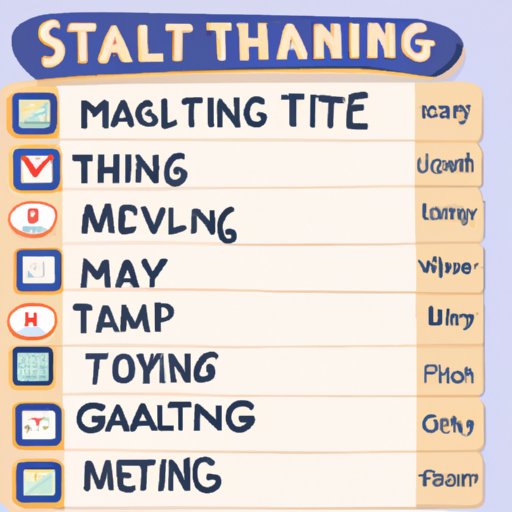Introduction
Time management is the process of organizing and planning how you spend the hours in your day to effectively accomplish your goals. It involves setting priorities, making lists, and scheduling specific blocks of time for certain activities. The goal is to maximize efficiency and productivity while also allowing time for relaxation and self-care.
Poor time management can lead to stress, missed deadlines, and an inability to complete tasks. It’s important to develop good habits and strategies to help you make the most of your time.

How to Create a Time Management Plan
The first step in creating an effective time management plan is to identify your goals and tasks. Make a list of all the things you need to do and prioritize them according to importance. This will help you determine which tasks should be done first and which ones can wait.
Next, schedule time for each task. Set aside specific blocks of time for studying, working, exercising, etc. This will help you stay focused and on track. You may want to use a calendar or planner to keep track of your schedule.
Benefits of Effective Time Management
There are numerous benefits to effective time management. Increased productivity is one of the most obvious advantages. When you manage your time wisely, you’re able to get more done in less time. This can help you reach your goals faster and make progress on projects more quickly.
Improved focus is another key benefit of good time management. When you plan ahead, you’ll have a clear understanding of what needs to be done and when. This will help you stay focused and avoid distractions. You’ll also have more energy and motivation to tackle difficult tasks.
Finally, effective time management can reduce stress. When you have a plan and know what needs to be done, it’s easier to stay calm and organized. You won’t be scrambling at the last minute to finish tasks or stressing out about upcoming deadlines.
Strategies for Improving Your Time Management Skills
There are several strategies you can use to improve your time management skills. One of the most important is to reduce distractions. Turn off notifications on your phone and limit the amount of time you spend on social media. If possible, find a quiet place to work where you won’t be interrupted.
Another useful strategy is to break down large tasks into smaller, more manageable pieces. This will make the task less overwhelming and help you stay focused. Additionally, try to utilize technology to your advantage. There are many apps and tools available to help you stay organized and on track.
Identifying and Overcoming Time-Wasting Habits
Many people struggle with time-wasting habits such as procrastination, perfectionism, and overthinking. To overcome these habits, you must first identify them and become aware of how they’re impacting your time management. Once you’ve identified the problem, you can start to look for alternatives. For example, if you’re prone to procrastination, try setting small goals and rewarding yourself for reaching them.
Making Time for Self-Care in Your Time Management Plan
It’s important to make time for self-care in your time management plan. Make sure to set aside time for relaxation and leisure activities. This will help you recharge and stay motivated. Additionally, learn to say “no” when needed. Don’t take on too much and don’t feel guilty for saying no to requests that don’t fit into your plan.

Setting Goals and Prioritizing Tasks to Improve Efficiency
Setting goals and prioritizing tasks are key components of effective time management. When setting goals, use the SMART method: Specific, Measurable, Achievable, Relevant, and Time-Bound. This will help you create achievable goals and give you a timeline for completion.
When prioritizing tasks, develop a system that works for you. Give each task a number based on its importance and urgency. This will help you focus on the most important tasks first.

Exploring the Link Between Productivity and Time Management
Productivity and time management are closely linked. To increase productivity, it’s important to create an environment that encourages productivity. This could include having a clean workspace, taking frequent breaks, and listening to music. Additionally, understand the relationship between productivity and time management. When you manage your time wisely, you can increase your productivity and complete tasks more efficiently.
Conclusion
Time management is an essential skill that helps us make the most of our time. By developing a plan, setting goals, and prioritizing tasks, we can increase productivity and improve focus. Additionally, it’s important to make time for self-care and recognize unproductive habits. With practice and dedication, anyone can master the art of time management.
A call to action: Take the time to assess your current time management practices and identify areas of improvement. Use the strategies outlined in this article to create an effective time management plan and start making the most of your time.
(Note: Is this article not meeting your expectations? Do you have knowledge or insights to share? Unlock new opportunities and expand your reach by joining our authors team. Click Registration to join us and share your expertise with our readers.)
